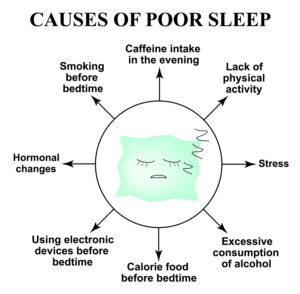 Do you get enough sleep? Many of my friends complain about not being able to stay asleep for eight hours. And sleep is apparently more important for people over 65 and 70. Few of us have developed healthy sleep habits.
Do you get enough sleep? Many of my friends complain about not being able to stay asleep for eight hours. And sleep is apparently more important for people over 65 and 70. Few of us have developed healthy sleep habits.
Who knew that being retired and having less to do would lead to not being able to sleep more? After all, we’re not exactly stressed out.
I have no problem falling asleep, usually in front of the TV. I can’t seem to stay awake after 9 p.m. which is a problem when you’re at a late dinner… But I can’t stay asleep. I wake up every two hours or so and get up at 4 a.m. Everyone’s different and as long as you get in quality sleep, your brain maintains health.
Some people have no problem disciplining themselves to go to sleep at a more reasonable time. Others are so used to late-night activities (reading, watching TV, being online, playing video games and writing novels) that they finally drop into bed at 1:00 or 2:00 a.m. But going to bed at 1:00 or 2:00 a.m. makes it difficult to get enough shut-eye. Turns out, healthy sleep habits for seniors include at least seven to eight hours of good sleep.
5 Healthy Sleep Habits
The Division of Sleep Medicine at Harvard Medical School offers tips to improve sleep. Rob and I recommend seniors try these five tips so they become sleep habits:
- Turn your bedroom into a sleep-inducing environment. Make it quiet, dark and cool. Add white noise if necessary. Keep tech-screens out. Turn your clock’s face away from you.
- Keep a pre-sleep routine. Just like babies, seniors can benefit with relaxing bedtime rituals like bathing, reading or relaxation exercises. If you can’t fall asleep after 20 minutes, try listening to music or reading. Avoid the temptation of more screen (light) time.
- Use natural light to your advantage. If needed, use a sleep mask or get heavy curtains. Let in the light first thing in the morning.
- Nap early – or not at all. If necessary, keep it short, and before 5:00 p.m.
- Avoid caffeine, alcohol, nicotine, and other chemicals that interfere with sleep. Limit coffee or tea after lunch, or use decaffeinated beverages.
Alcohol is commonly used as a sleep aid. However, although alcohol can help a person fall asleep more quickly, the quality of sleep is compromised. Drinkers beware and be informed. Irregular sleep isn’t the only bad result with regular drinking. It raises the risk for dementia and Alzheimer’s. Yes, I know, small doses of red wine are recommended for health and longevity. It’s just that few drinkers are truly moderate to the degree they say, from my observations.
Alcohol also tends to worsen the symptoms of sleep apnea, which further disrupts sleep. It can lead to more serious problems like cognitive impairments and dementia (not to mention that it disrupts others sleeping in the room).
If you’re not getting at least 7½ hours of sleep a night, ask your doctor for advice. Pills aren’t always the best idea especially when you’re already taking medications for other conditions. But something natural like melatonin could help.
Don’t ignore your need for quality sleep as you age. Instead, develop and maintain healthy sleep habits. Some say sleep is just as important for senior health as exercise and nutrition.

Recent Comments